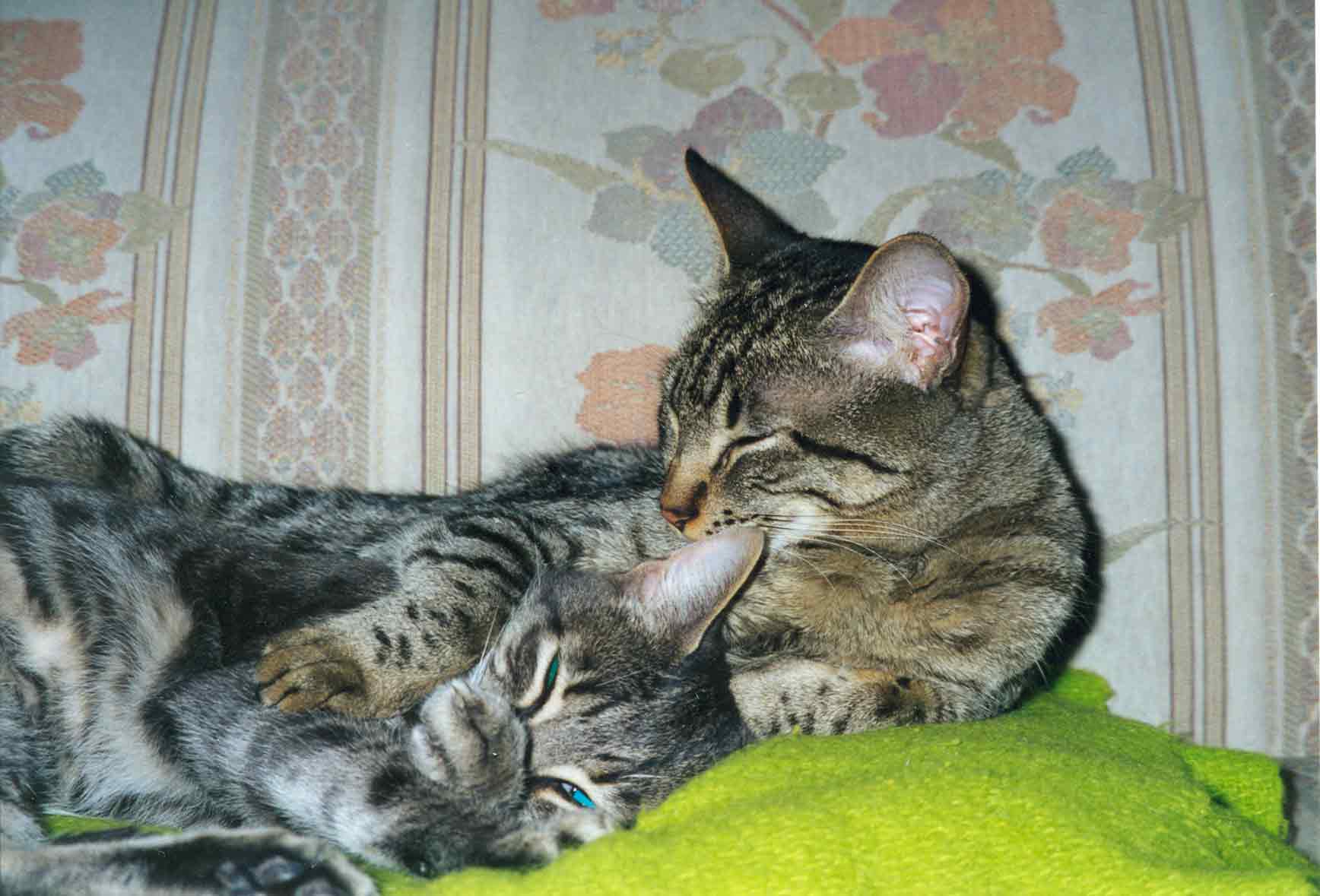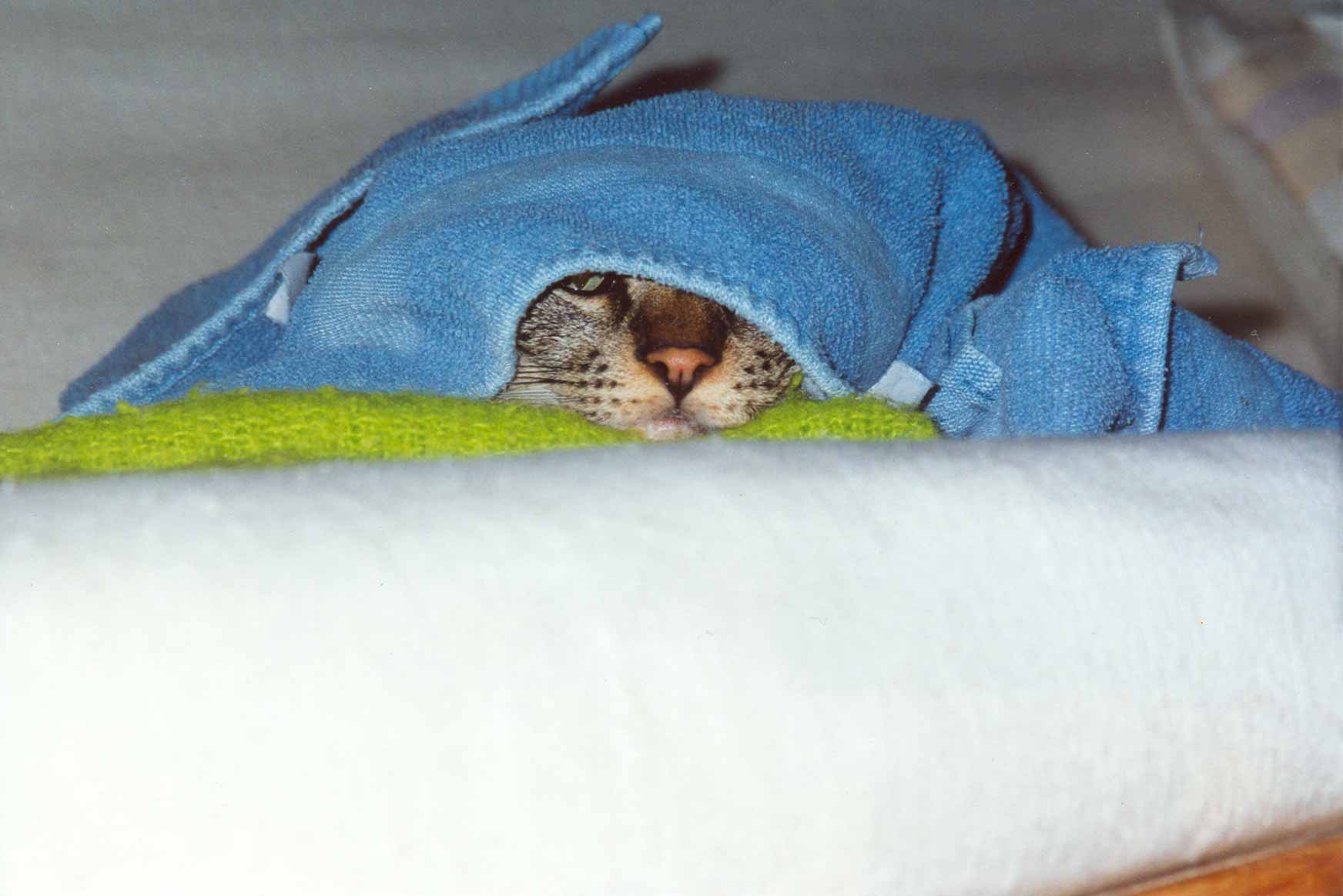|
|
|
|
|
|
|
|
|
|
|
|
|

FAQ (Frequently Asked Questions)
|


|
|
What is hyperthyroidism and how does it affect my cat? Hyperthyroidism is a disease of older cats (average age is 12-14 yrs old) caused by excessive secretion of thyroid hormone by abnormal thyroid cells located in a (usually) benign nodule in one or both thyroid glands (1% of hyperthyroid cats can have a malignant thyroid cancer for which 131I is the best treatment). Thyroid glands are located in the neck. Elevated thyroid hormone levels cause increased metabolism and the other common clinical signs of hyperthyroidism: weight loss, appetite changes, increased water consumption, vomiting, diarrhea, rapid heart rate, heart murmur, elevated blood pressure, increased vocalization, muscle weakness and poor haircoat, although not every cat experiences all of these symptoms. Hyperthyroidism tends to be a gradual onset disorder, with many cats losing weight slowly over several months or a few years. If left untreated, the increased metabolism will eventually cause organ failure (heart, kidney, blindness due to retinal detachment) and premature death. We do not currently know why hyperthyroidism is a common disorder in older cats. How can hyperthyroidism be diagnosed? Your veterinarian can perform blood tests to determine if your cat has hyperthyroidism. Since older cats with the most common signs of hyperthyroidism (weight loss, appetite changes and vomiting) can also have other problems such as kidney disease, heart disease, diabetes and inflammatory bowel disease, a thorough physical examination, blood testing and urinalysis are usually indicated to allow diagnosis of hyperthyroidism. Radiographs, cardiac ultrasonography and blood pressure determination are also sometimes performed. How can hyperthyroidism be treated? There are four options for treating feline hyperthyroidism: medical management, dietary management, surgery to remove the thyroid gland(s) and radioactive iodine (131I) therapy. Medical Management: Oral or transdermal antithyroid medications (methimazole) can be used to reduce excessive thyroid hormone secretion. These medications must be given for the rest of the cat's lifetime. Side effects serious enough to warrant discontinuing using these medicines occur in up to 5 percent of cats taking them and can include loss of appetite, vomiting, liver dysfunction, bone marrow suppression and allergic skin reactions. Hyperthyroid cats being maintained on antithyroid medicines should have regular blood testing (every 4-6 months) for the remainder of their lifetime. A common misconception about medical management of hyperthyroidism is that it's the least expensive way to treat the disease. Antithyroid medicines can cost up to $2.00 per day, depending on which formulation is used. Also, the periodic examinations and blood testing required two or three times yearly to accurately and safely dose these medications can cost about $150 to $350 per year. This means an owner will spend $450.00 to $850.00 per year for the rest of the cat's life to medically manage hyperthyroidism! Dietary Management: An iodine restricted diet (Prescription Diet Y/D) can be used to control hyperthyroidism. Cats must eat ONLY the Y/D diet for this treatment option to succeed. Surgical Management: Surgery to remove the thyroid gland(s) involves general anesthesia risk and can result in serious calcium regulation difficulties after surgery if the parathyroid glands, or their blood supply, are inadvertently damaged during surgery. Following successful surgical treatment for hyperthyroidism, 10-20 percent of cats will become hyperthyroid again in their lifetime. Surgery can be the treatment of choice in the rare hyperthyroid cat with severe medically unresponsive and life threatening congestive heart failure because one can achieve resolution of hyperthyroidism in a matter of hours. Cats with very large thyroid nodules (more than 3-4 cm diameter) can also require surgery to debulk their thyroid masses before treatment with 131I. Radioactive Iodine (131I) Therapy: Radioactive iodine (131I) therapy takes advantage of the fact that dietary iodine is used in the body only by cells of the thyroid glands. 131I therapy uses a radioactive isotope of iodine that is administered as an injection under the skin (just like vaccines are given). The 131I will be taken up preferentially into the "most active" thyroid cells, which are the thyroid cells in the nodule(s) or tumor(s) that are overproducing thyroid hormone. The radiation energy is emitted and absorbed within a few millimeters of where the iodine accumulates in the body (i.e. the hyperthyroid tissue) and will kill these abnormal thyroid cells. Anesthesia is not required for 131I therapy. Following 131I administration, cats are housed in individually ventilated large cages in a shielded radiation safety room for 3 nights to allow most of the radioactive iodine to be excreted and remain behind at the clinic. The 3 night stay after 131I administration is required by Oregon Radiation Protection Statutes. The clinic is booked through April 2022 and then will be closing. We will not be scheduling new cases. |
1045 Gateway Lp, Suite F • Springfield, OR 97477
Phone/Fax: 541.744.2966 • Office Hours By Appointment Only
©2021 Feline Thyroid Clinic. All Rights Reserved.
| Home | FAQ | Office Location | Client Feedback | Referral Info | Other Resources | Contact Us |